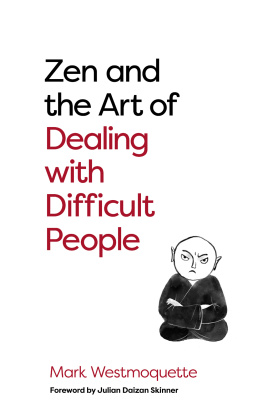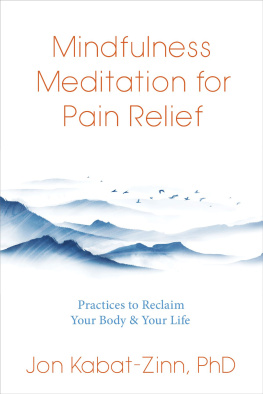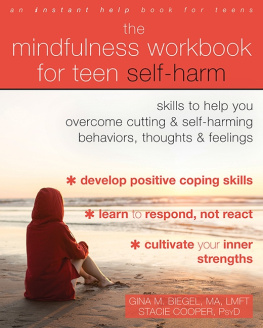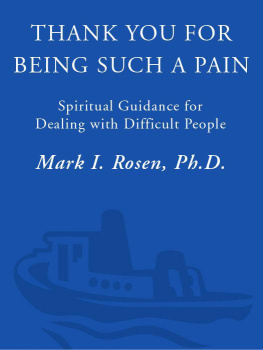


Zen and the Art of Dealing with Difficult People
Mark Westmoquette
First published in the UK and USA in 2021 by
Watkins, an imprint of Watkins Media Limited
Unit 11, Shepperton House, 8393 Shepperton Road
London N1 3DF
Design and typography copyright Watkins Media Limited 2021
Text copyright Mark Westmoquette 2021
The right of Mark Westmoquette to be identified as the Author of this text has been asserted in accordance with the Copyright, Designs and Patents Act of 1988.
All rights reserved. No part of this book may be reproduced in any form or by any electronic or mechanical means, including information storage and retrieval systems, without permission in writing from the publisher, except by a reviewer who may quote brief passages in a review.
Commissioning Editor: Fiona Robertson
Editor: Steve Marshall
Editorial Assistant: Brittany Willis
Head of Design: Glen Wilkins
Production: Uzma Taj
A CIP record for this book is available from the British Library
ISBN: 978-1-78678-548-0 (Paperback)
ISBN: 978-1-78678-610-4 (eBook)
10 9 8 7 6 5 4 3 2 1
Typeset by Lapiz
Printed in the United Kingdom by TJ Books Ltd
www.watkinspublishing.com
I tell everyone that just as they say that children are mirrors to their parents, so too all those one comes in contact with are your own mirrors. Therefore, if you give all your heart and try your best to communicate, you are sure to get a similar response. So, please lead a life in which you think of what you can do for others, not what others can do for you. Interact with others by trying to give all your heart and doing your best to communicate.
(Japanese Tendai Buddhist Monk Mitsunaga Kakudo)
CONTENTS
FOREWORD
Buddhas appear troublesomely; ancestors teach in detail.
(Keizan)
As a young Zen monk, my life was pressed against others. There was nowhere to hide. For seven years I lived in a one-mat space in the monastery meditation hall surrounded by twenty fellow monks. There we meditated, slept and sometimes ate. The life was designed to be stripped of distractions. The training process was compared to a rock tumbler. The inevitable interpersonal manifestations of selfishness were expected to grind against each other, the idea being that we novices would enter as rough pebbles and emerge as polished jewels. Sometimes feelings ran high. The only time Ive ever chased someone with murder in my mind was during this period. In our little world there were a number of attempted suicides and one that went all the way.
Most often, however, the outcome was very different. I have seen for myself psychologically well-adjusted, unselfish and luminous human beings emerge from this abrasion. The essence of the work was clarity and awareness. When leavened with generosity of spirit, humour and compassion, transformation could be rapid. The quotation above, a rather free translation from the work of Japanese Zen master Keizan (12681325), was frequently cited by our teachers.
Your troublesome Buddha is the person who presses your buttons, bringing up sensitivities and irritation, jealousy, inadequacy or other buried miscontents. No suffering can be dealt with in the abstract. It is only as these things arise into consciousness that we have the opportunity to resolve them.
The key to the transformation is to recognize the opportunity in the pain. Its so easy to blame the other person, to blame the past, to blame the system and, speaking personally, a lot of the time thats precisely what I did. Its also possible to blame yourself, even to deny the presence of such unworthy antisocial feelings.
But Zen monastery life is set up to make any of these stances unsustainable. Eventually, all being well, the trainee starts to turn the light around to be present with the pain, to give it an arena of non-judgemental, non-reactive awareness. In this compassionate awareness the physical, energetic, emotional and mental dimensions of the suffering begin to untwist and will eventually re-integrate (to use the Jungian term) into a new harmonious relationship with the whole.
None of this can happen without the initial suffering arising. Hence that difficult person is actually the true teacher, the Buddha, of the moment. And what of the teaching in detail? Subjectively, the process can feel quite relentless. Until the hot button is fully dealt with, the associated pain will arise and arise. Perhaps its natural to think of spiritual life as a withdrawal from the distractions and drama of our humanity. This withdrawal is certainly possible. For example, after his own enlightenment beneath the Bodhi Tree, the Buddha was faced with a choice. He could remain, enjoying the fruits of his quest in peace and solitude, becoming a pratyekabuddha a silent Buddha. Or he could get up from his sitting place and begin the tiresome work of training others to confront their suffering. The fact that he is remembered reveals the Buddhas choice and the compassionate spirit that looks beyond individual benefit.
It seems that from his earliest days of teaching, the Buddha strongly promoted the ideal of sangha spiritual fellowship. Furthermore, he defined his teaching as one in which one does not keep quarrelling with anyone in the cosmos. To this day, disharmony and schism in the sangha are considered matters of the gravest importance. Why would this social dimension of practice be so important? According to the so-called social proximity effect, our nature as group animals determines that we humans inevitably become more like those with whom we spend the most time. But as well as mutual reinforcement and support, the Zen tradition highlights the growth potential of spirited and even dramatic mutual challenge in the sangha :
Once Zen master Obaku (died 850) sent his student Rinzai to deliver a letter to another Zen masters monastery.
At that time Gyosan was guest master. He took the letter and asked: This letter is from Obaku; but his special messenger, what has he to do with it?
Rinzai immediately slapped him.
Gyosan stopped him and said: Elder brother, since you know about this matter, lets cease.
After his study of the old Zen records unexpectedly revealed that most often the students moment of awakening is prompted by an interaction, our teacher in Japan, Zen master Shinzan, developed a mutual inquiry process that he called group sanzen . Here at Zenways we continue this work in our Breakthrough to Zen retreats. I believe one of the most awe-inspiring and beautiful experiences a human being can have is to witness this moment of shift in another.
But practice with others is not just about this elevated level of human development. Alongside his unstinting praise for those within his sangha who embodied compassion, love and wisdom, the Buddha, to the end of his life, had to devote tremendous time and energy to dealing with abusive supporters, false accusations of sexual misconduct, even worldly ambition that reached the level of attempted murder. His enlightenment didnt release him from engagement with these realms. And if its true for the Buddha, its going to be true for the rest of us. However profound and transforming your inner cultivation becomes, your practice will involve dealing with human soap opera for life. In whatever sphere you find yourself, your fellow travellers are unlikely to be perfect; your teachers and seniors are unlikely to be perfect; you yourself are unlikely to be perfect.
Next page











